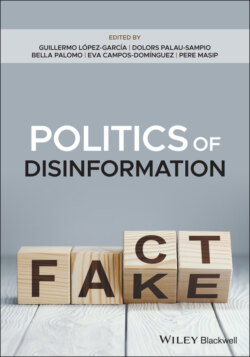Читать книгу Politics of Disinformation - Группа авторов - Страница 22
Estimated and Evaluated Effects
ОглавлениеAnother trend in the descriptive approach has paid attention to the effects of fake news on the cognitive level. While some studies have described the estimated effects of this type of disinformation on citizens, especially on sensitive political issues, a growing amount of experimental research has produced mixed results regarding the negative impacts of fake news on deliberative processes.
Studies focusing on the estimated effects of fake news mainly come from social epistemology (Levy 2017; Rini 2017; Faulkner 2018; Fallis and Mathiesen 2019). According to these scholars, the social media ecosystem has heightened the adverse effects of disinformation since it potentially amplifies the reach of stories posted by its users (Rini 2017). Additionally, platforms assist purveyors of fake news by addressing their content toward those partisan audiences who are most susceptible to their beliefs and share their publications (Levy 2017). Consequently, people who believe in fake news are less capable of making good choices related to their epistemic environment because these false stories often collide with reports diffused by reliable institutions (e.g. mainstream news media, science) (Fallis and Mathiesen 2019).
However, the experimental research so far has shown mixed results that do not necessarily correspond to the negative tone shared by social epistemologists regarding the presumed adverse effects of fake news on the public sphere. Broader studies about the spread of false stories have shown that this type of content circulates much less than expected, even during elections (Allcott and Gentzkow 2017). Vargo et al. (2018) also demonstrated that fake news influenced the agenda of only the alternative right-wing media in the US media landscape from 2014 to 2016.
Until now, some studies have suggested that the circulation of fake news is often limited to individuals who are highly committed to burning social issues. That is, engagement with fake news content is restricted to a subset of heavy internet users with a high availability for media consumption (Nelson and Taneja 2018). Partisanship has been considered a particularly potent moral disposition that separates people from factual information, especially when that information challenges their initial preferences. Therefore, demagoguery could be more appealing for a few citizens than factual and accurate information, especially when it reinforces their pre-existent worldviews (Barrera et al. 2020). Scholars have argued that individuals who are susceptible to trusting political elites (Van Duyn and Collier 2018) are more likely to believe in fake news. Likewise, the more partisan a citizen is, the more likely they are to consider themselves and their comrades impervious to disinformation (Jang and Kim 2018).
However, even research connecting fake news with the older phenomenon of partisanship lacks a concern with the material conditions that increase the circulation of disinformation in unstable political contexts. Although political elites’ propagandistic use of social media platforms to circumvent journalism contributes to our epistemic environment’s pollution, we argue that this situation was only possible due to changes in the capital accumulation cycle.
